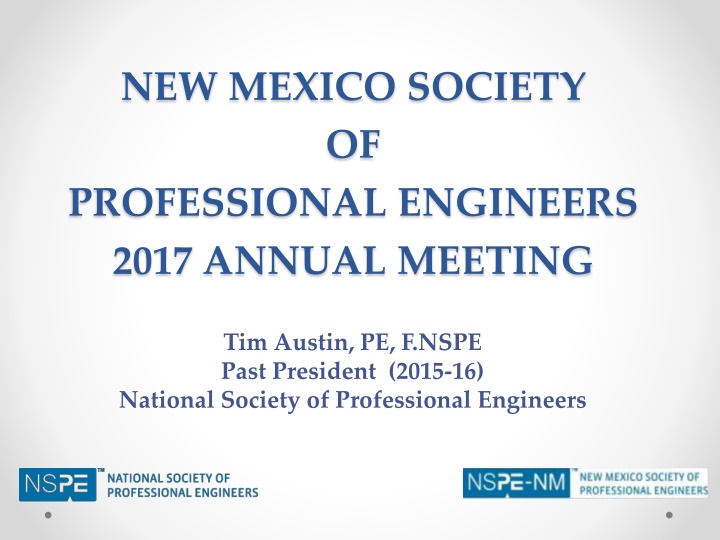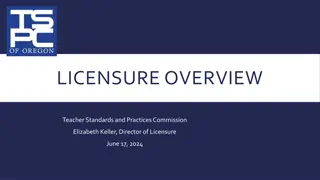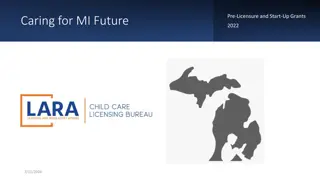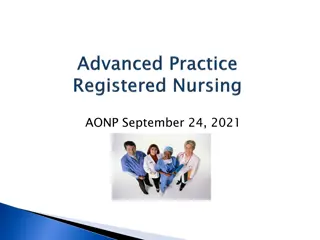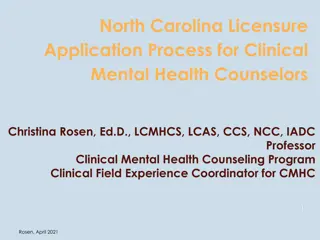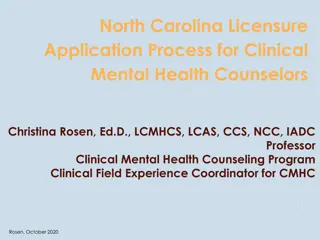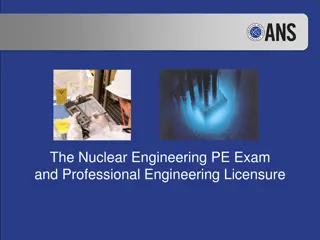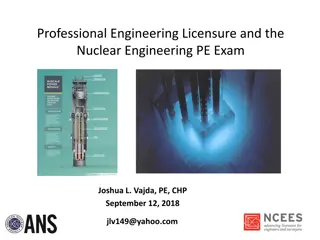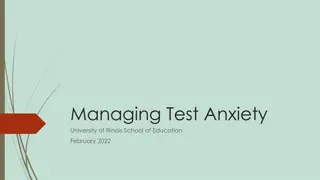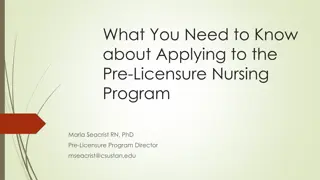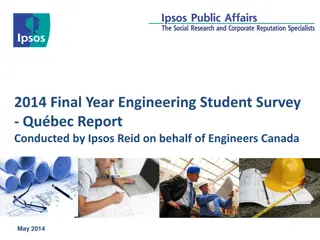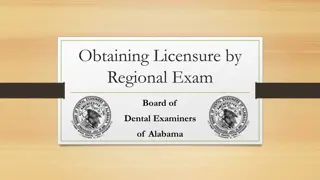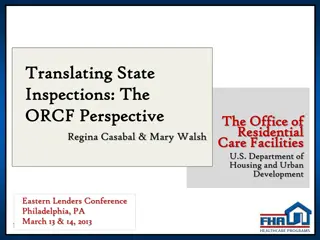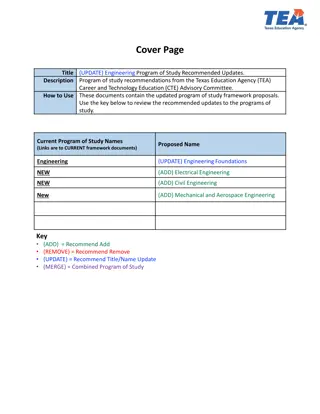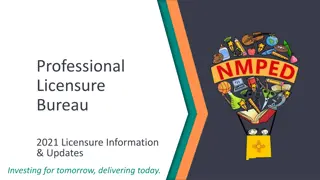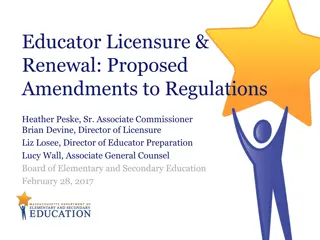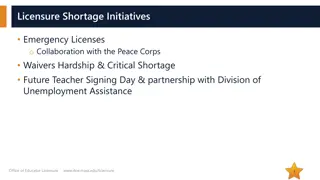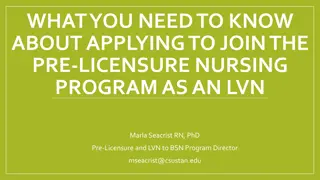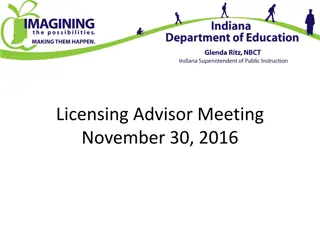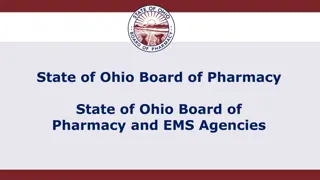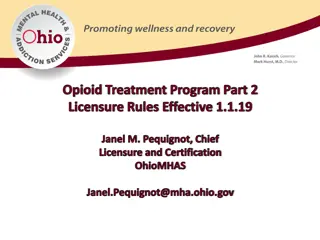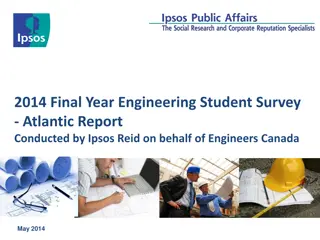The Significance of Engineering Licensure in Today's Professional Landscape
Exploring the importance of engineering licensure, this content delves into the role of licensed professional engineers in safeguarding public welfare, demonstrating competency, and upholding ethical standards. It touches upon perspectives on engineering licensure, its value to the public, and what it means to individuals in the industry. The content also raises questions about the relevance of licensure in today's economic world and the dichotomy of engineering in empowering self-sufficiency.
Download Presentation

Please find below an Image/Link to download the presentation.
The content on the website is provided AS IS for your information and personal use only. It may not be sold, licensed, or shared on other websites without obtaining consent from the author.If you encounter any issues during the download, it is possible that the publisher has removed the file from their server.
You are allowed to download the files provided on this website for personal or commercial use, subject to the condition that they are used lawfully. All files are the property of their respective owners.
The content on the website is provided AS IS for your information and personal use only. It may not be sold, licensed, or shared on other websites without obtaining consent from the author.
E N D
Presentation Transcript
NEW MEXICO SOCIETY OF PROFESSIONAL ENGINEERS 2017 ANNUAL MEETING Tim Austin, PE, F.NSPE Past President (2015-16) National Society of Professional Engineers https://www.nspe.org/sites/all/themes/nspe/logo.png
Transcending the Professional Engineer https://www.nspe.org/sites/all/themes/nspe/logo.png
IS ENGINEERING LICENSURE STILL RELEVANT IN TODAY S ECONOMIC WORLD? https://www.nspe.org/sites/all/themes/nspe/logo.png
The Dichotomy of Engineering Engineers focus on tools and solutions that help people to help themselves. In other words, engineers must ask themselves, "How can I make myself irrelevant?" https://www.nspe.org/sites/all/themes/nspe/logo.png
The Professional Engineer Licensed engineers continue their commitment to protecting the health, safety, and welfare of the public through demonstrated competency and subjecting themselves to a code of conduct backed by the force of law. To a client, it means you've got the credentials to earn their trust. To an employer, it signals your ability to take on a higher level of responsibility. To the regulator, it means competency. https://www.nspe.org/sites/all/themes/nspe/logo.png
What does it mean to the public? https://www.nspe.org/sites/all/themes/nspe/logo.png
The Non-Engineer Perspective Non-technical or technologist can be as qualified or suitable substitute Licensed professionals cost more Turf protection Certifications are sufficient protection Codes, standards and regulations provide acceptable protection Lack of awareness or understanding as to PE https://www.nspe.org/sites/all/themes/nspe/logo.png
What does your license mean to YOU? https://www.nspe.org/sites/all/themes/nspe/logo.png
The Professional Engineer To yourself, it's likely a symbol pride and measure of your own hard-won achievement. BUT IT IS MORE Willingness to accept risk Willingness to serve Willingness to be accountable https://www.nspe.org/sites/all/themes/nspe/logo.png
PE is our badge of honor. It publicly symbolizes personal pride, integrity, responsibility, commitment. https://www.nspe.org/sites/all/themes/nspe/logo.png
But can it mean even more? https://www.nspe.org/sites/all/themes/nspe/logo.png
NSPE Code of Ethics Preamble Engineering is an important and learned profession. As members of this profession, engineers are expected to exhibit the highest standards of honesty and integrity. Engineering has a direct and vital impact on the quality of life for all people. Accordingly, the services provided by engineers require honesty, impartiality, fairness, and equity, and must be dedicated to the protection of the public health, safety, and welfare. Engineers must perform under a standard of professional behavior that requires adherence to the highest principles of ethical conduct. https://www.nspe.org/sites/all/themes/nspe/logo.png
MASLOWS HEIRARCHIY OF NEED https://www.nspe.org/sites/all/themes/nspe/logo.png
Transcendence - That is, such individuals seek a benefit beyond the purely personal and seek communion with the transcendent, perhaps through mystical or transpersonal experiences; they come to identify with something greater than the purely individual self, often engaging in service to others. https://www.nspe.org/sites/all/themes/nspe/logo.png
NSPE Code of Ethics ..adherence to the highest principles of ethical conduct. https://www.nspe.org/sites/all/themes/nspe/logo.png
Have we given everything? https://www.nspe.org/sites/all/themes/nspe/logo.png
Growing chorus that engineers are not doing enough for humanity. https://www.nspe.org/sites/all/themes/nspe/logo.png
Chronicle for Higher Education Fools for Tools , by John Kaag and Sujata Bhatia, PE. We worry that the many conveniences delivered by modern engineering makes citizens loath to interrogate the moral implications of technological progress. https://www.nspe.org/sites/all/themes/nspe/logo.png
NSPE Code of Ethics I. Fundamental Canons Engineers, in the fulfillment of their professional duties, shall: 1. Hold paramount the safety, health, and welfare of the public. If we take this canon seriously, it implies something counterintuitive about the skill set of tomorrow s engineers, namely they should be experts in discussing and determining what constitutes the common good. ~ Ibid https://www.nspe.org/sites/all/themes/nspe/logo.png
NSPE Code of Ethics III. Professional Obligations 2. Engineers shall at all times strive to serve the public interest. a. Engineers are encouraged to participate in civic affairs; career guidance for youths; and work for the advancement of the safety, health, and well-being of their community. Encouraged? That tepid suggestion fails to reflect the nature of the obligation that engineers should have to their fellow citizens . ~ Ibid https://www.nspe.org/sites/all/themes/nspe/logo.png
NSPE Code of Ethics I. Fundamental Canons Engineers, in the fulfillment of their professional duties, shall: 6. Conduct themselves honorably, responsibly, ethically, and lawfully so as to enhance the honor, reputation, and usefulness of the profession. The call to conscience of the final canon might be regarded as a moment of wishful thinking or as the lynchpin that ensures that all of the other, more specific tenets of its ethical code will be followed . ~ Ibid https://www.nspe.org/sites/all/themes/nspe/logo.png
Engineers bear a responsibility to consider both nontechnical and technical solutions to societal challenges. Because engineers have the skills to bring their visions to fruition, the engineer is both an arrowsmith and archer, shaping the future direction of society. The key question for the engineer is: What kind of society am I creating? ~ Ibid https://www.nspe.org/sites/all/themes/nspe/logo.png
The Great Reversal - How We Let Technology Take Control of the Planet By David E. Tabachnick the occasion for the writing this book is the related concern that the increasing technological character of the world is somehow threatening the future of humanity . https://www.nspe.org/sites/all/themes/nspe/logo.png
On the surface it makes sense that only those who fully understand the complexities of a technology who know what it can and cannot do are qualified to make decisions about its larger health and societal effects. In turn, legislators and regulators should heed the advice of the technologists and develop and enforce appropriate laws and prohibitions. ~ Tabachnick https://www.nspe.org/sites/all/themes/nspe/logo.png
For Aristotle, to be ethical was more than simply knowing right from wrong, but also meant the capacity to act upon the knowledge. ~ Ibid https://www.nspe.org/sites/all/themes/nspe/logo.png
What role should professional engineers play in technological change? https://www.nspe.org/sites/all/themes/nspe/logo.png
EXAMPLES AUTONOMOUS VEHICLES ARTIFICIAL INTELLIGENCE GENE EDITING TRANSHUMANISM INTERNET OF THINGS https://www.nspe.org/sites/all/themes/nspe/logo.png
Bill Joy, co-founder Sun Microsystems We have yet to come to terms with the fact that the most compelling 21st century technologies pose a different threat than the technologies that have come before . ~ Why the Future Doesn t Need Us, Wired Magazine, 2000 https://www.nspe.org/sites/all/themes/nspe/logo.png
Stephen Hawking, physicist "The development of full artificial intelligence could spell the end of the human race. ~ As reported by the BBC, December 2014
Elon Musk, founder Tesla Motors and SpaceX Musk who was speaking at the Massachusetts Institute of Technology (MIT) Aeronautics and Astronautics department s Centennial Symposium said that in developing artificial intelligence (AI) we are summoning the demon. I m increasingly inclined to think there should be some regulatory oversight maybe at the national and international level, just to make sure that we don t do something very foolish .~ Elon Musk
Bill Gates, co-founder Microsoft "I am in the camp that is concerned about super intelligence. First the machines will do a lot of jobs for us and not be super intelligent. That should be positive if we manage it well. "A few decades after that though the intelligence is strong enough to be a concern. I agree with Elon Musk and some others on this and don't understand why some people are not concerned." ~ As reported by the BBC, January 2015
As technological advances increase, it is apparent more than ever before that licensed professional engineers need to take a leadership role in the ethical development, application and use of technology. https://www.nspe.org/sites/all/themes/nspe/logo.png
They didn't understand what they were doing. I'm afraid that will be on the tombstone of the human race. ~ Michael Crichton, author https://www.nspe.org/sites/all/themes/nspe/logo.png
How will you transcend as a Professional Engineer? www.nspe.org @NSPE_HQ @TimAustin_PE https://www.nspe.org/sites/all/themes/nspe/logo.png
